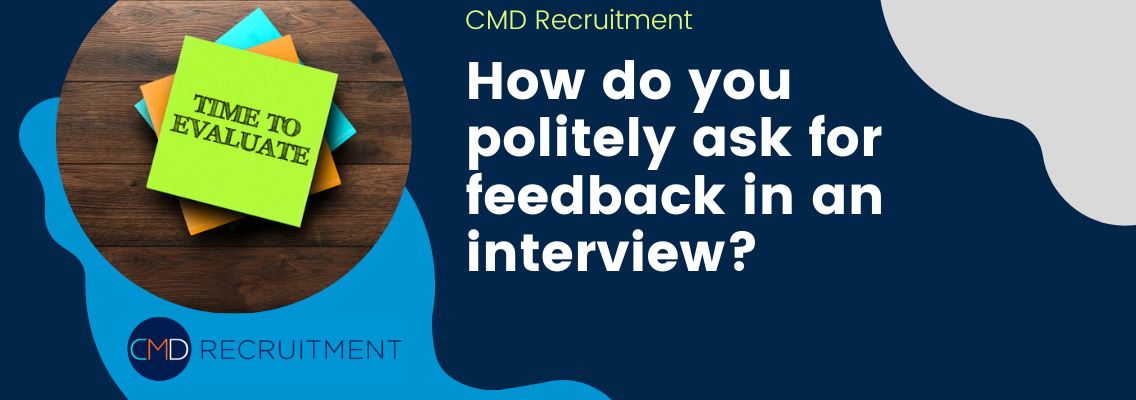Important notice - We are aware of a scam where people are impersonating CMD Recruitment to offer jobs via WhatsApp & Telegram. This is a scam, CMD Recruitment will never contact new candidates via these methods. Any legitmate offer from CMD Recruitment would be made via a telephone call.

August 15, 2022
When you’re interviewing for a new job, it’s important to make a good impression. But what happens if you don’t think you did as well as you could have? How do you go about asking for feedback without coming across as desperate or unsure of yourself? And is there an ideal time to ask for feedback that won’t ruin your chances of getting the job?
It can be difficult to know how to ask for feedback after an interview. After all, no one wants to seem like they didn’t do their best. However, if you’re sincere and polite in your request, most people will be happy to give you some pointers on how you can improve next time.
In this guide, we will explore why feedback is so essential and then offer some advice on how you can ask for feedback in any interview setting.
Feedback is an important part of the interview process. It can help you to identify your strengths and weaknesses so that you can work on improving your weaknesses. Additionally, feedback can help to give you a better understanding of the employer’s perspective and what they are looking for in a candidate.
Asking for feedback also shows that you are proactive and eager to learn. This can make a good impression on potential employers, even if they don’t have any constructive criticism to offer. And if you are making obvious mistakes in your interview performance, then you’ll be easily able to address this issue for your next interview.
Ideally, you should wait until the interview is over before asking for feedback. This way, you won’t appear to be admitting that you think the interview has gone badly. When requesting feedback, it is important to make it clear that you would appreciate any thoughts or suggestions, even if they aren’t all positive. This will show that you’re open to criticism and willing to learn from your mistakes.
You could say something like, “I would really appreciate any feedback you can give me on my performance today. I’m always looking to improve my interview skills.”
Or you could say, “Thank you for taking the time to interview me. I would love to have your feedback so that I can improve for next time.”
You can ask for feedback in person, or via email after the interview. Sending a follow-up email is a popular choice as it allows you to create a connection with the hiring manager. You could also send them a message on LinkedIn.
When it comes to asking for feedback, there is no one-size-fits-all approach. However, there are a few things you can keep in mind to make sure you come across as sincere and professional. First, make sure to thank the interviewer for their time. This shows that you appreciate their feedback and are grateful for the opportunity to interview with them.
Second, be specific in your request. Ask for feedback on your performance as a whole or focus on a particular area that you would like to improve. Finally, express an interest in working for the company, even if you feel like the interview went poorly. This will show that you’re still enthusiastic about the opportunity, so they might keep you in mind for future roles.
You should ask for feedback on your performance soon after the interview. If you leave it too long, there is a good chance they won’t be able to remember the specifics of your interview. Additionally, you don’t want to seem too desperate by asking for feedback too soon.
Give them a day or two to process the interview before sending a follow-up message. They might still be conducting interviews and could see your message as a way of pushing them to make a decision. If they’re on the fence about you, assuming that you didn’t get the job too soon could sway them in the wrong direction.
They might assume that you lack confidence in your abilities. So, you can either way a few days after the interview, or you can wait to find out you haven’t secured the job before asking for feedback.
It can be difficult to know how to ask for feedback after an interview, but it’s important to do if you want to improve your chances of landing the job. Every interview that doesn’t turn into a job should be treated as a learning opportunity.
Rather than feeling disappointed, you should feel appreciative that you’ve had the opportunity to practice your technique. Interview skills are something that you learn, they don’t always come naturally to people, so don’t be afraid to ask for feedback if you need it.
Back to Blog